#kaddish for the soul of judaism
Text
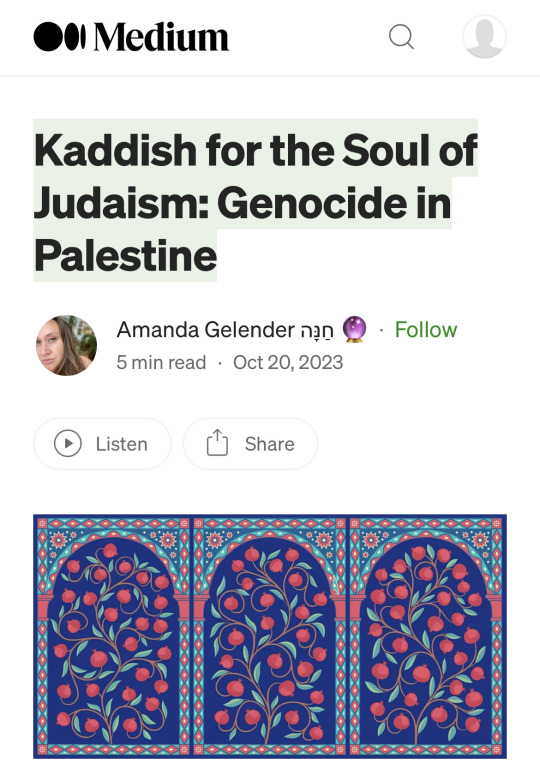
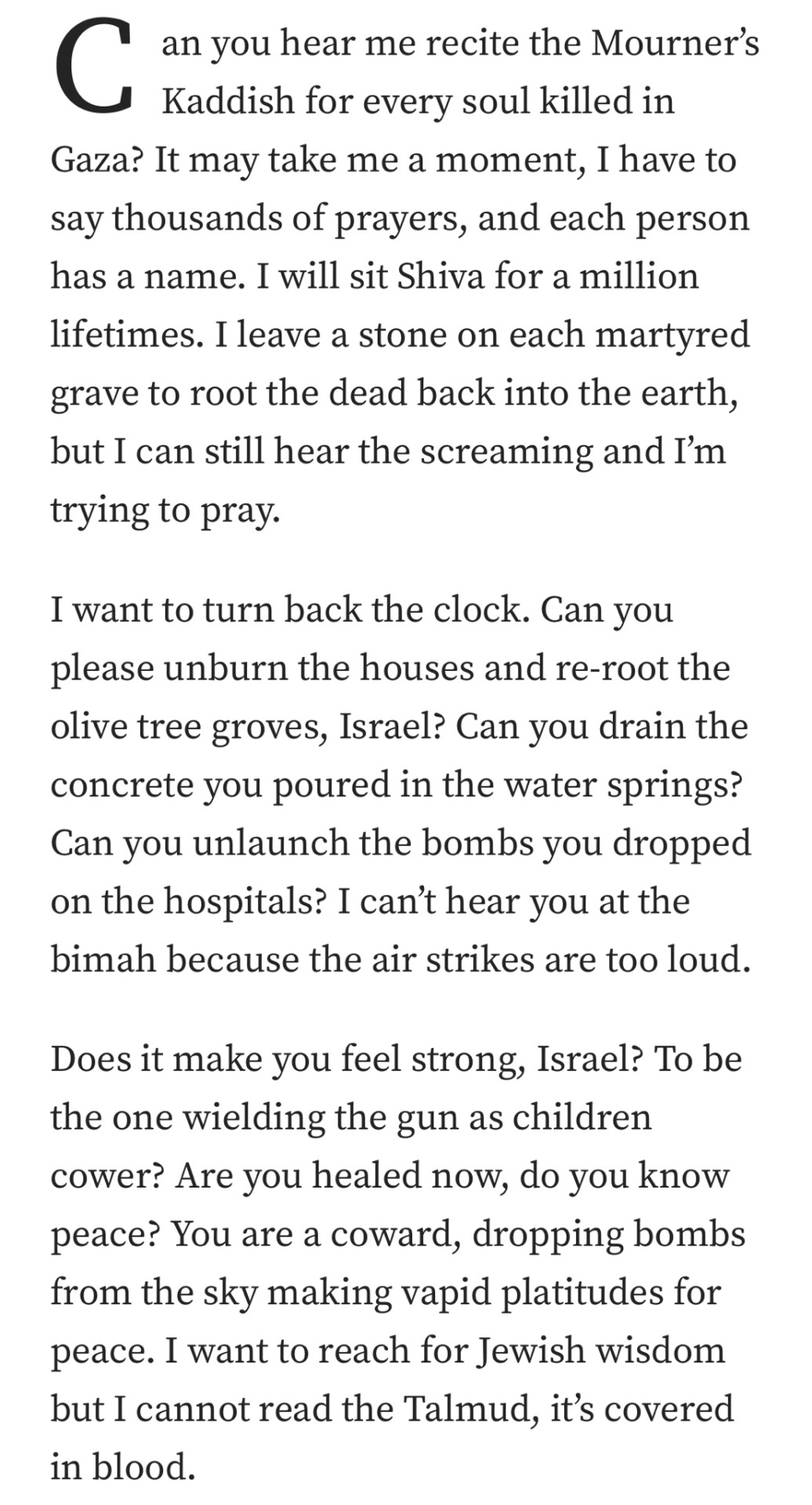

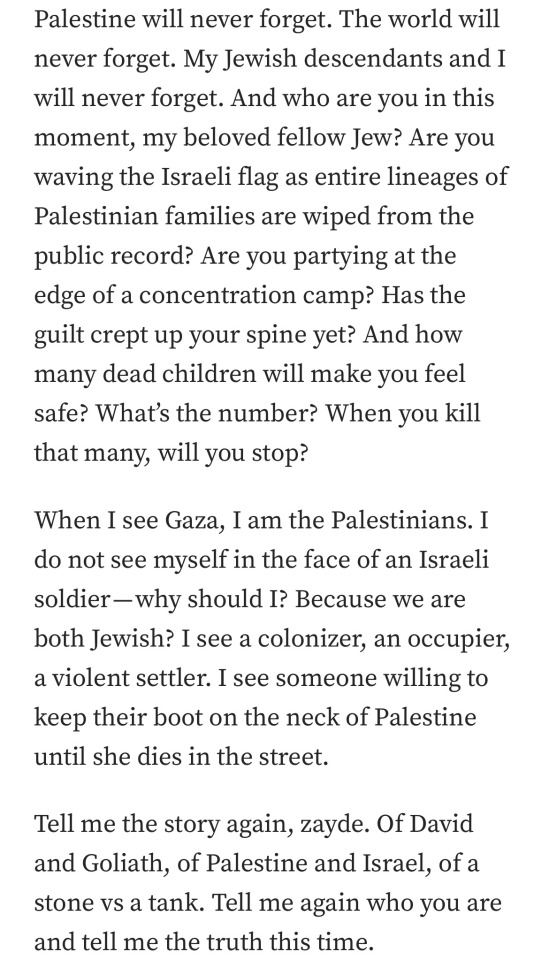
#i only posted an excerpt#the whole article is worth reading#free palestine#palestine#jews for palestine#free gaza#gaza#anti zionisim#anti zionist jew#kaddish for the soul of judaism
17K notes
·
View notes
Text

Me when I know what settler colonialism is so that I can make concrete steps to make sure it doesn’t happen again
38 notes
·
View notes
Text
By Amanda Gelender
As I write this, the wheels of genocide are turning. As I write this, I am preparing for Shabbat.
When I see Gaza, I see my own people languishing in concentration camps. I see a world that has turned its back on us, letting us be slaughtered en masse because we aren’t quite human enough.
...
You — who squat in stolen homes and kidnap children. You — who rape, murder, mutilate, humiliate, then take a photo. You — Israel. You are not me, you never were. My Judaism spans thousands of years. My Judaism is expansive, righteous, boundless, rooted. I am a miracle of Jewish diasporic vision that could never be contained by a military state. I have no love for you or your fascism, Israel. I don’t know you and I never did.
...
When I see Gaza, I am the Palestinians. I do not see myself in the face of an Israeli soldier — why should I? Because we are both Jewish? I see a colonizer, an occupier, a violent settler. I see someone willing to keep their boot on the neck of Palestine until she dies in the street.
#a powerful piece that captures my feelings as a Jew#free palestine#ceasefire now#stop the genocide#gaza#palestine#being jewish#jewblr#judaism
125 notes
·
View notes
Text
I can’t be the only person who finds that “Kaddish for the soul of Judaism” shit self-indulgent and rhetorically suspect. Like I understand being in emotional pain and I feel it myself but there’s mourning and there is self-flagellating doomerism that only reifies Israel’s terms. I’m sorry you as a diaspora Jew are content to perform your guilt on our collective behalf, shrug your shoulders, and continue shoveling dirt on what the Nazis almost succeeded in eradicating. How convenient for you. There has to be a future for Jewish practice and culture and art outside of Zionism.
25 notes
·
View notes
Text
I’m having a nightmare, can you please wake me up? I’m dreaming that they fooled the Jewish people to do the bidding of western imperialism. To feed their tech, their fascism, their bank accounts, their global death squads for the expansion of empire. That us Jews wiped out villages and stole indigenous land, maintaining 75 years of genocide. All I see are pieces of G-d’s dead children in plastic grocery bags — can you please wake me up?
[...]
Palestine will never forget. The world will never forget. My Jewish descendants and I will never forget. And who are you in this moment, my beloved fellow Jew? Are you waving the Israeli flag as entire lineages of Palestinian families are wiped from the public record? Are you partying at the edge of a concentration camp? Has the guilt crept up your spine yet? And how many dead children will make you feel safe? What’s the number? When you kill that many, will you stop?
When I see Gaza, I am the Palestinians. I do not see myself in the face of an Israeli soldier — why should I? Because we are both Jewish? I see a colonizer, an occupier, a violent settler. I see someone willing to keep their boot on the neck of Palestine until she dies in the street.
Tell me the story again, zayde. Of David and Goliath, of Palestine and Israel, of a stone vs a tank. Tell me again who you are and tell me the truth this time.
AMANDA GELENDER is an anti-zionist, Jewish American woman. She has been part of the Palestinian solidarity movement since 2006.
13 notes
·
View notes
Link
As I write this, the wheels of genocide are turning. As I write this, I am preparing for Shabbat.
When I see Gaza, I see my own people languishing in concentration camps. I see a world that has turned its back on us, letting us be slaughtered en masse because we aren’t quite human enough.
I am having a nightmare, can you wake me up? I’m dreaming that the Star of David is not sewn onto our clothes but affixed to the genocidal soldiers who bomb hospitals, schools, and churches with no regard for life. Who round up entire communities and shoot kids dead in the street.
I remember there was talk of Tikkun Olam and Tzedakah — is our humanity buried somewhere under the rubble? Is anyone still breathing under there? I scour bombed remnants of residential buildings for shreds of Judaism’s soul. I thought it was still here. I thought so many things that evaporated in the dust of an air strike.
We built institutions and monuments to “never forget” but look at us now. It seems we left our humanity outside the door of the holocaust memorial museum. Jews are a diasporic miracle trapped in a nation state of lies. Israel has sacrificed our humanity at the altar of nationalism.
There’s no anesthesia in the hospital but can you bear the pain a bit longer, Palestine? We would help, but our hands are already covered in blood.
I want to invite all of Gaza to Shabbos dinner tonight — is there an evacuation route you won’t bomb, Israel? And when the Shabbat candles dim, can my friends please use the keys around their necks to finally return home?
Perhaps one day we will pull a Gazan child’s diary from the rubble and ash. We will dust off the casings and gun powder. Will we be able to read her words under blood-soaked paper? Did her dreams die in the phosphorous gas dropped on her head? Our grandchildren will ask us about the Palestinian genocide and why the world didn’t intervene. Was she too brown or was it just “too complicated?”
Did you hear about the boy from Gaza who took his own life this week? Who saw hell on earth and chose to leap into the unknown instead of being murdered by an airstrike? Lay his body on the pile too, please, next to the shoes at Auschwitz. My ancestors from Mount Masada will protect him — they too chose to die by their own hand rather than suffer the indignity of slaughter by the tyrant. Things fall apart.
A pregnant Palestinian woman was blasted dead by an Israeli air strike this week. Doctors tried to deliver her baby from the mother’s dead corpse. I don’t know if the baby lived. If she did, can she sit under our sukkah next year so the sun can grace her face?
Can you hear me recite the Mourner’s Kaddish for every soul killed in Gaza? It may take me a moment, I have to say thousands of prayers, and each person has a name. I will sit Shiva for a million lifetimes. I leave a stone on each martyred grave to root the dead back into the earth, but I can still hear the screaming and I’m trying to pray.
I want to turn back the clock. Can you please unburn the houses and re-root the olive tree groves, Israel? Can you drain the concrete you poured in the water springs? Can you unlaunch the bombs you dropped on the hospitals? I can’t hear you at the bimah because the air strikes are too loud.
Does it make you feel strong, Israel? To be the one wielding the gun as children cower? Are you healed now, do you know peace? You are a coward, dropping bombs from the sky making vapid platitudes for peace. I want to reach for Jewish wisdom but I cannot read the Talmud, it’s covered in blood.
Gaza is starving, can she eat at our Seder? Can you jump on the tracks before this train arrives at Bergen-Belsen? Can you distract the guard and dump the Zyklon B? Can you poison the commander or throw a rock of resistance at his tank? Can you see a Palestinian as human before you turn on this deadly gas? It’s all quite unpleasant and distracting me from prayer.
I’m wailing at the wall. I need challah for Shabbos but Israel bombed the last bakery in Gaza. Palestine is hungry for justice and the dehydration is setting in.
I’m having a nightmare, can you please wake me up? I’m dreaming that they fooled the Jewish people to do the bidding of western imperialism. To feed their tech, their fascism, their bank accounts, their global death squads for the expansion of empire. That us Jews wiped out villages and stole indigenous land, maintaining 75 years of genocide. All I see are pieces of G-d’s dead children in plastic grocery bags — can you please wake me up?
You — who squat in stolen homes and kidnap children. You — who rape, murder, mutilate, humiliate, then take a photo. You — Israel. You are not me, you never were. My Judaism spans thousands of years. My Judaism is expansive, righteous, boundless, rooted. I am a miracle of Jewish diasporic vision that could never be contained by a military state. I have no love for you or your fascism, Israel. I don’t know you and I never did.
I wish we had time to ponder what this all means for the soul of Judaism. But it’s Shabbat and the wheels of genocide are already turning. And my beloved Jewish people are driving this bus off the cliff. Can you feel this empire of dust crumbling to the ground? Is bombing really a balm for your crushed spirit?
Have you ever wondered why the nazi soldier didn’t lay down his weapon? I have. What idea, what nation state, did he believe in so much that he could mow us all down and laugh? What could have made him see that we deserved to live? That Palestine deserves to be free?
Palestine will never forget. The world will never forget. My Jewish descendants and I will never forget. And who are you in this moment, my beloved fellow Jew? Are you waving the Israeli flag as entire lineages of Palestinian families are wiped from the public record? Are you partying at the edge of a concentration camp? Has the guilt crept up your spine yet? And how many dead children will make you feel safe? What’s the number? When you kill that many, will you stop?
When I see Gaza, I am the Palestinians. I do not see myself in the face of an Israeli soldier — why should I? Because we are both Jewish? I see a colonizer, an occupier, a violent settler. I see someone willing to keep their boot on the neck of Palestine until she dies in the street.
Tell me the story again, zayde. Of David and Goliath, of Palestine and Israel, of a stone vs a tank. Tell me again who you are and tell me the truth this time.
15 notes
·
View notes
Text
"Can you hear me recite the Mourner’s Kaddish for every soul killed in Gaza? It may take me a moment, I have to say thousands of prayers, and each person has a name. I will sit Shiva for a million lifetimes." -Amanda Gelender, Kaddish for the Soul of Judaism: Genocide in Palestine
10 notes
·
View notes
Text
For the past few years I’ve been on a Judaism conversion path. But since October 7th I’ve been unable to reconcile my love of Hashem with the horrors and atrocities committed by the state of Israel. My soul sings for Lekha Dodi. For Amidah. It mourns when I recite The Mourner’s Kaddish. But I cannot pray in a shul that ends its service with the anthem of a country that commits genocide.
I am at war with my soul. I am grieving.
5 notes
·
View notes
Text
1 note
·
View note
Note
do jewish people believe in spirits/ghosts?? i am considering converting for my fiance but i don't know if my belief in ghosts is a problem.
hi, well first of all, if your fiance is jewish there might be some stuff you already know, so i apologize if i come off as condescending at any point!
ah, the eternal question--whenever someone asks "do jewish people believe--" i hope they are prepared for frustration because judaism has become--de facto if not de jure--a very flexible and individually-customizable beast while still requiring a need for some sort of community. like sure, there are 613 commandments and a whole bunch of rules that we in-community kind of poke fun of, but people in the Conservative tradition, Reform, Reconstructionist, or just unaffiliated often wind up kind of picking and choosing what to believe/do. i assume frum (orthodox) folks are adhering much more in unison to the rules, but even so, judaism and its scholarly tradition requires study and debate, and often leaves a matter resolved with a "we don't know," so this by nature leaves a lot of diversity of belief in its wake.
i hope all jews believe there is only one (1) god, who does not exist in any corporeal form, and i hope we all believe to an extent in some of the founding myths (in all their many interpretations), and in the power of doing mitzvot (good deeds) here on earth in the moment instead of living for the afterlife. and--it's genuinely shocked me how many times i've had to explain this since i left the nyc bubble--very important, we don't believe that jesus was in any way a part of god, or a god figure, or even a prophet--he was just an irl historical figure who was very influential (and very human). well, you probably know that, but maybe someone who is reading this doesn't. Other than that i've seen people believe or not believe all kindsa weird shit, but it's their business.
so does judaism believe in ghosts? hmm. well, i do if that helps--i do very strongly based on personal experiences i've had, and i'm literally employed by my synagogue very part-time to lead services lol. (i used to have a sort of steady weekend gig back in the day but they ran out of money lmaooo whole long story.) i don't believe in like, ghosts in a white sheet going ooOooOoooo, but more like a vibe, a presence you can feel, of a soul/souls or their essence that was trapped in a place. (the way i've felt in certain sites in europe that i literally had no idea had nazi activity, oh boy!) devarim, the 5th book of the bible, has some prohibitions about not trying to contact the dead, which implies to me that maybe whoever wrote down the words of the torah (was it god? or, well--that's a whole nother debate, whoo.) thinks the dead do exist in a state that could be contacted, implying some sort of ghost or spirit.
there also is a lot of jewish mysticism that i don't know a lot about, where i'm sure the supernatural comes up, but another takeaway i can provide is that "the dead" are quite present in religious services even though judaism as a whole focuses very hard on the living and has few answers for what happens in the afterlife. during every service you say something called the "mourner's kaddish" (prayer). normally the kaddish is sung with various different melodies depending on the point in the service, but the mourner's kaddish is chanted by the rabbi or service leader, and the congregation chimes in at certain points. if you are in mourning for a loved one, whether it's within a year of them passing or the anniversaries (yahrzeit) of their death, you will stand to recite the prayer, BUT people also stand "for those who have nobody to stand for them" and during every service, usually sandwiched between some very lively songs, you stop to remember the dead and i swear in that room you can feel something, man, there's something. you're not just there with the people whose faces you can see.
do jewish people believe in spirits and ghosts? i would say you definitely can. you can see if you can work those beliefs into a standard jewish belief system, or if you can't, and they're at odds with other things about judaism you do like, there's meaning to be found in that struggle too. after all one of the patriarchs of judaism, jacob, is eventually given the name yisrael which means "wrestle with god," and that name became representative of the jewish people as a whole, at least in prayer. but i think there's a lot of things about judaism that imply that there other things in a room, in a space, in the universe, that are not corporeal.
this was a useless and very jewish style answer but i hope it can help! good luck to you and your fiance.
3 notes
·
View notes
Text
The Tradition of Sitting Shiva: A Window into Jewish Mourning

The Tradition of Sitting Shiva: A Window into Jewish Mourning
When someone in the Jewish community passes away, family and friends often gather to offer support and remember the departed. One of the most significant customs associated with Jewish mourning is “sitting shiva.” Sitting shiva is a practice that provides comfort and solace to the bereaved, allowing them to navigate the difficult journey of grief within the warm embrace of their community. In this blog, we’ll explore the history, significance, and various aspects of sitting shiva in Jewish tradition.
Understanding the Meaning of Shiva
The term “shiva” is Hebrew for “seven,” which directly reflects the seven-day mourning period that typically follows the burial of a loved one. During this period, immediate family members, such as children, siblings, and spouses, observe a strict form of mourning. The core idea behind sitting shiva is to allow the grieving family to focus on their grief and healing without the distractions of daily life.
The Origins of Shiva
The practice of sitting shiva has ancient roots, dating back to biblical times. In the Book of Job, for example, we find evidence of a seven-day period of mourning. Similarly, the Book of Genesis describes Jacob’s intense grief after learning of his son Joseph’s apparent death. This historical connection shows that the concept of sitting Shiva has deep cultural and religious significance in Judaism.
The Shiva Process
The process of sitting shiva involves several key elements:
The Seven Days: As mentioned earlier, the mourning period lasts for seven days. This period begins immediately after the burial.
The Mourning Home: The bereaved family typically sits shiva at their home or the home of the deceased. They often cover mirrors, remove leather items, and sit on low chairs or cushions to symbolize their grief.
Reciting Kaddish: During the shiva period, family members often gather to recite the Kaddish, a traditional Jewish prayer that sanctifies God’s name and expresses the hope for the deceased’s soul to find peace.
Community Support: Friends, neighbors, and other members of the community visit the mourners, bringing food, offering condolences, and lending a sympathetic ear. The support of the community is a vital component of shiva, reinforcing the idea that grief is a shared experience.
Abstaining from Work: Observing shiva typically involves refraining from work and other daily responsibilities, allowing the grieving family to concentrate on their mourning.
Wearing Torn Clothing (Keriah): Family members may rend a piece of their clothing as a symbol of mourning and loss.
The Significance of Sitting Shiva
Sitting shiva serves multiple essential functions:
Healing and Grief Processing: The focused period of mourning helps the family navigate the complex emotional journey of loss. It encourages them to express their emotions, remember the deceased, and find comfort in their faith.
Community Support: The presence of friends and neighbors provides a crucial network of support. It reminds the mourners that they are not alone in their grief and that the community is there to help them heal.
Respect for the Deceased: Sitting shiva is a way to honor and remember the departed by gathering loved ones and sharing stories about their life.
Connecting with Jewish Tradition: Observing shiva connects the mourners with their Jewish heritage and religious identity.

3026 Hempstead Tpke. Levittown, NY 11756
516.418.7000
1 note
·
View note
Text
fundamentally “psychedelic mushrooms saleswoman” and “corporate diversity consultancy business owner” are the two funniest things for that Kaddish for the soul of Judaism article to be. And yet
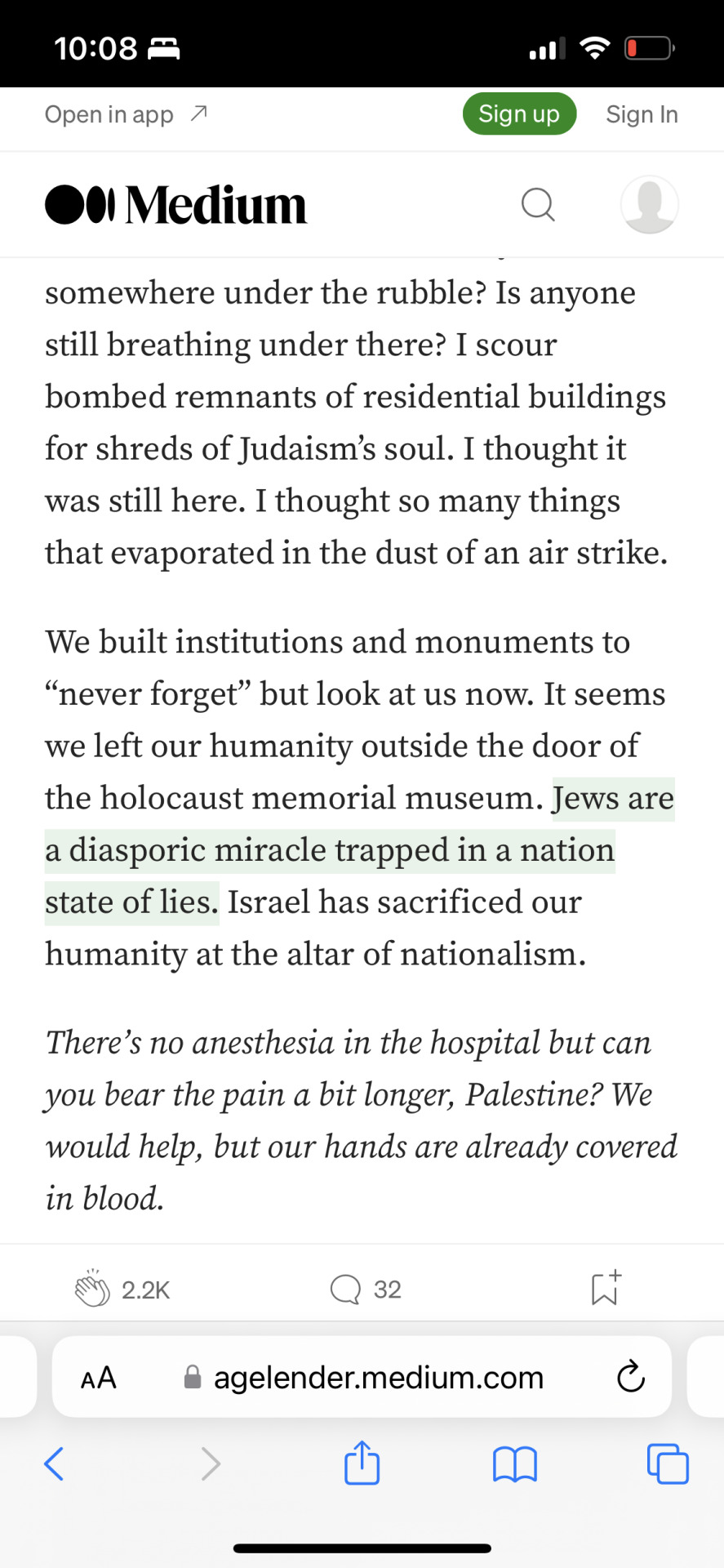
7 notes
·
View notes
Text
Courtesy of @miceofpardise
0 notes
Text
Against Genocide: A Palestinian Solidarity Panel
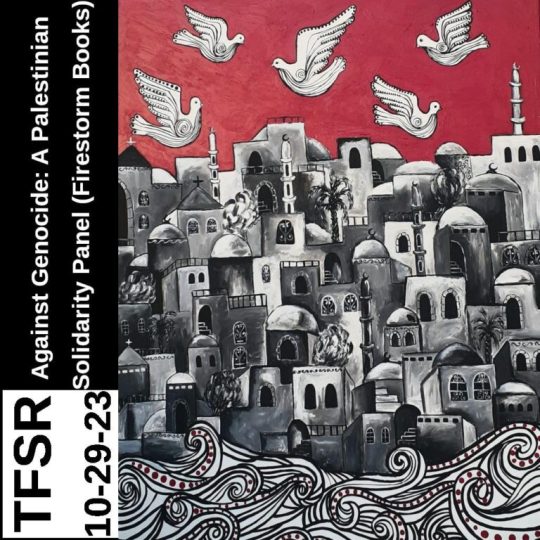
This week on The Final Straw, we’re happy to share a panel discussion recorded at Firestorm Books entitled Against Genocide: A Palestinian Solidarity Panel, recorded on Sunday, October 22nd 2023. From the event description:
“With the "iron-clad" support of the United States and other Western powers, Israel has made explicit its plan for the systematic destruction of Gaza and the Palestinian people. At this event, participants—including Palestinian and Jewish activists—will discuss the history of the occupation and the present campaign of dehumanization that's paving the way to genocide. We'll also explore the radical solidarities that are necessary to stop the assault on Gaza and secure a just peace.
This event is a fundraiser for The Hebron International Resource Network (HIRN), an organization based in the West Bank that is working to house Gazan workers deported to the West Bank by Israeli forces. Please consider bringing a cash donation! Firestorm will additionally be donating the net proceeds from all sales in-store and online.
Art by Heba Zagout, Palestinian artist killed with her two young children in an Israeli airstrike on Gaza on Friday, October 13.”
Transcription
PDF (Unimposed) - pending
Zine (Imposed PDF) - pending
Zines suggested by Milstein
Inexorable Links by Zara from Interviews With Radical Palestinian Women
Tkhines For A Free Palestine
Kaddish For The Soul of Judaism: Genocide In Palestine
Three Perspectives on Zionism, Jewishness, Class, and Liberation
Jewish Currents Israel-Palestine Explainer
Announcement
Support Former Political Prisoner Zolo Azania
Former Black political prisoner and friend to many of us, Zolo Azania, needs our financial assistance to pay for important repairs on his car. He uses his car to drive to work. Details below. Please be generous.
Zolo recently had a new transmission installed in his car along with other necessary repairs. The total bill came out to $4,659.51. He had put aside $1,200 for car repairs, therefore he needs another $3,459.51 in order to reclaim his car.
After spending nearly 37 years in Indiana prisons, Zolo has been free for nearly 7 years now. After facing many challenges on the outside, we’re very happy to say Zolo now owns a house! Of course he needs to pay a mortgage and pay for repairs and upkeep on the house. After working 5 years at low paying jobs, Zolo was recently able to obtain a better paying job with benefits. This job requires a commute which is difficult on public transportation.
Zolo would like to avoid excessive charges for the dealership to store his car. If Zolo cannot pay this repair bill he risks losing his car altogether.
Zolo appreciates any donation but please be as generous as you can.
You can send donations to him via Zelle, Venmo or Cash App ($ZoloAzania5). His accounts are under “Zolo Azania”
Bad News #72 Online Now!
You can find the October 2023 episode of the English-language BAD News: Angry Voices From Around The World podcast produced by the A-Radio Network online now, featuring a short version of our interview about the December 8th case in France, updates from Greece by way of the comrades in Thessaloniki at 1431AM Free Social Radio, and Frequenz-A about the about the Karl Helga Wagenplatz in Leipzig, which is under the threat of ever-present forces of gentrification.
Check out this episode!
1 note
·
View note
Note
I loved reading your answer to the arcadia question, so I have a similar one. In Kaddish (the episode immediately following memento mori) the M/S dynamic is a unusual. Mulder seems unusually willing to let Scully “drive” and I always wondered if it was because she felt she had something to prove and he understood that. What do you think?
Okay! So! Kaddish! An episode I really love. I (like DD) headcanon that Mulder was raised Jewish (at least by his mother - I usually write his household as one of mixed traditions) and there are some references to this in the episode (at least the horrible anti-Semitic newsletter guy says Mulder looks Jewish), so I think this storyline has extra resonance for him. After Memento Mori, seeing a young bride mourning her lost fiancé that she never actually had a chance to marry must have really hit him hard. Religion is something that’s not comfortable for him or a comfort for him, but that doesn’t mean it doesn’t touch something inside him to think about the Jewish process of grieving. Scully may believe in an afterlife, but he doesn’t, and I’m sure he sees Ariel’s life as empty and bleak, and some kind of foreshadowing for the empty, bleak life he’ll have when Scully dies. I think he envies Ariel’s golem. He doesn’t have the faith that would give him access to that kind of mysticism, and both he and Ariel know that the golem is a poor substitute for the person she lost, but what else is there? An unthinkable nothingness. A life suspended. If they can’t go forward together, there’s no future worth living.
He knows from Beyond The Sea that she wants to throw herself into work so that she doesn’t really have to deal with her feelings. It works out as a dynamic for them, because he tends to withdraw when he doesn’t want to deal with his feelings. He doesn’t want to talk about his Judaism, and he knows she doesn’t want to talk about her cancer. Letting her take the lead is a kindness and also a kind of shirking of his responsibilities. He doesn’t want to look at any of it head-on. And he can’t help but face it - the golem has “truth” written on its forehead, “emet”. That’s his whole quest. But the difference between emet and met, between truth and death, is a single aleph. He doesn’t want to behold Scully’s truth. He doesn’t want to behold her death. He can’t let her go. He wouldn’t be able to make Ariel’s brave choice. He doesn’t have that kind of relationship to his own Judaism. He can’t say kaddish for Scully and let her go. He can’t sit shiva. But he is, in a way, inside himself, preparing himself to mourn her. He’s preemptively covering the mirrors in his heart.
The irony, of course, is that Scully wants to protect him, golem-like, to her death and beyond. Ariel gets to create her own sense of closure by marrying her ersatz Isaac, but for Mulder and Scully, neither of them can see that as an option, except maybe in the secret depths of their souls. But what would it change? A wedding can’t ward off death. They’ve just been confronted with the very real evidence of that. Ariel, unofficially wed, is a widow just as truly as Mulder will be an unofficial widower. Neither of them can see how a ritual could save them, not even Scully with her faith. So they leave all the words unsaid, because the words can only create a semblance of life, a golem, a bulwark against danger but not a true partner.
So he lets her take charge in case it’s one of their last chances, and because this expertise is too tender and personal to share as much of as his knowledge about everything else cryptid and cryptic.
Thanks for the ask!
77 notes
·
View notes